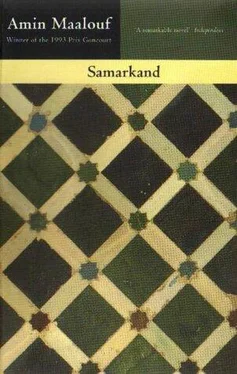For the moment, the two women’s projects were at a standstill. Omar refused to bend to their demands. Anyway, it would have served no use as the confrontation between Nizam and Hassan had become unavoidable.
That same day, the audience hall was a peaceful arena, and the fifteen people there were content to watch in silence. Malikshah himself, usually so exuberant, was conversing in hushed tones with his chamberlain while idiosyncratically twiddling with the ends of his moustache. From time to time he shot a glance at the two gladiators. Hassan was standing up, wearing a creased black robe and a black turban and wearing his beard lower than usual. His face was furrowed and his searing eyes were ready to meet those of Nizam, although they were red with fatigue and lack of sleep. Behind him a secretary carried a bundle of papers tied up with a wide band of Cordovan.
As a privilege that comes with age, the Grand Vizir was seated, or more correctly slumped, in a chair. His robe was grey, his beard flecked with white and his forehead wizened. Only his glance was young and alert, one might even say sparkling. Two of his sons accompanied him, flashing looks of hatred or defiance.
Right next to the Sultan was Omar, as dour as he was overwhelmed. He was drawing up in his mind various conciliatory words which he would doubtless not have occasion to utter.
‘Today is the day that we were promised a detailed report on the state of our Treasury. Is it ready?’ asked Malikshah.
Hassan leaned over.
‘My promise has been kept. Here is the report.’
He turned towards his secretary who came forward to meet him and carefully untied the leather band holding together the pile of papers. Sabbah started to read them out. The first pages were, as custom would have it, expressions of thanks, pious discourses, erudite quotations and well-turned eloquent pages, but the audience was waiting for more. Then it came:
‘I have been able to calculate precisely,’ he declared,’ what the tax office of every province and known town has sent in to the royal Treasury. In the same way, I have evaluated the booty won from the enemy and I now know how this gold has been spent …’
With great ceremony, he cleared his throat, handed to his secretary the page he had just read, and fixed his eyes on the next one. His lips opened a little and then shut tight. Silence fell again. He threw aside the leaf of paper and then set that one aside with a furious gesture. There was still silence.
The Sultan was becoming a little anxious and impatient:
‘What is going on? We are listening to you.’
‘Master, I cannot find the continuation. I had arranged my papers in order. The sheet I am looking for must have fallen out. I shall find it.’
He leafed through them again, rather pathetically. Nizam made the most of the situation by intervening, in a tone which tried to sound magnanimous:
‘Anyone can lose a piece of paper. We should not hold that against our young friend. Instead of waiting around, I propose that we go on with the rest of the report.’
‘You are right, ata , let us go on with the report.’
Everyone noticed that the Sultan had called his Vizir ‘father’ anew. Did this mean that he was back in favour? While Hassan was still caught up in the most pathetic state of confusion, the Vizir pushed his advantage:
‘Let us forget this lost page. Instead of making the Sultan wait, I suggest that our brother Hassan presents to us the figures on some important cities or provinces.’
The Sultan was eager to agree. Nizam carried on:
‘Let us take the city of Nishapur, for example, the birthplace of Omar Khayyam, who is here with us. Could we be informed how much that city and its province have contributed to the Treasury?’
‘Immediately,’ responded Hassan, who had been trying to land on his feet.
He had ploughed expertly through his pile of papers, trying to extract page thirty-four where he had written everything about Nishapur, but it was in vain.
‘The page is not there,’ he said. ‘It has disappeared, I have been robbed of it … Someone has messed up my papers …’
Nizam stood up. He went up to Malikshah and whispered in his ear: ‘If our master cannot have confidence in his most competent servants who are aware of the difficulty of projects and can tell the difference between the possible and the impossible, there will be no end to his being thus insulted, held up to ridicule, and fair game for the ignorant, the foolish and charlatans.’
Malikshah did not doubt for a moment that Hassan had just been the victim of some practical joke. As the chroniclers reported, Nizam al-Mulk had succeeded in bribing Hassan’s secretary and ordered him to filch some pages and to misfile others, reducing to nought the patient work carried out by his rival. Hassan tried in vain to claim that he was the victim of a plot, but his voice could not be heard over the tumult, and the Sultan, disappointed to have been duped, but even more so to realize that his attempt to shake his Vizir’s tutelage had failed, directed the whole blame onto Hassan. Having ordered his guards to seize him, he there and then sentenced him to death.
For the first time, Omar spoke up: ‘May our Master be merciful. Hassan Sabbah may have made mistakes, he may have sinned through an excess of zeal or enthusiasm, and he should be dismissed for these misdemeanours, but he is in no way guilty of a serious misdeed against your person.’
‘Then let him be blinded! Bring the galenite and heat up the iron.’
Hassan stayed silent and it was Omar who spoke up again. He could not allow a man, whom he had had engaged, to be silenced or blinded.
‘Master,’ he begged, ‘do not inflict such a punishment on a young man who could only find solace in his disgrace by reading and writing.’
Malikshah then stated:
‘It is for your sake, khawaja Omar, the wisest and purest of men, that I agree to retract a decision of mine yet again. Hassan Sabbah is thus condemned to be banished and will be exiled to a distant country until the end of his life. He will never be able to tread anew upon the soil of the empire.’
But the man from Qom was to return and carry out an exceptional act of vengeance.
BOOK TWO. THE ASSASSINS’ PARADISE
Both Paradise and Hell are in you
OMAR KHAYYAM
Seven years had past, seven years of plenty both for Khayyam and the empire, the last years of peace.
On a table under an awning of vine stood a long-necked carafe for the best Shiraz white wine with just the right hint of muskiness and all around a hundred bowls burst into a riotous feast. Such was the ritual of a June evening on Omar’s terrace. He recommended starting with the lightest, first of all the wine and fruit, then the cooked dishes such as rice with vine-leaves and stuffed quince.
A soft wind from the Yellow Mountains blew through the orchards in flower. Jahan picked up a lute and plucked one string and then another. The drawn-out slow music accompanied the wind. Omar raised his goblet and inhaled deeply. Jahan was watching him. She chose from the table the largest, reddest and softest jujube and offered it to her man, which, in the language of fruit, signified ‘a kiss, straight away’. He leant over to her and their lips brushed against each other, separated, touched again, parted and joined. Their fingers intertwined, a serving girl arrived, and without undue haste they separated and both picked up their goblets. Jahan smiled and murmured:
‘If I had seven lives, I would spend one coming here to stretch out every evening on this terrace; I would lounge on this divan drinking this wine and dangling my fingers in this bowl, for in monotony lurks happiness.’
Читать дальше












